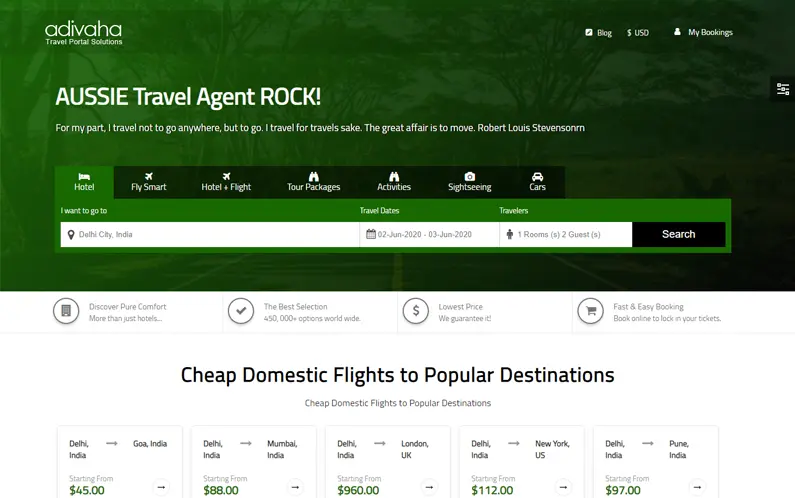Ready to go-LIVE travel solutions that helps your travel agency to sell a range of travel services pretty instantly. adivaha® travel solutions make sure you have no boundation over your imagination, you can do everything online, without the need for any technical knowledge or design skills. Easy Backoffice, extensive reporting with integrated Funds Management System.
Drupal Boosts Travel Agency Websites to New Heights.
Drupal for travel agencies is a versatile content management system that offers robust features for building and managing websites tailored for the travel industry. With the integration of Drupal with the Worldspan API, travel agencies can access a wide range of travel information and services, enhancing the overall user experience. The seamless integration allows travel agencies to offer real-time booking options, dynamic pricing, and inventory management, making it easier for customers to plan and book their travel arrangements directly on the website.
In addition to the Worldspan API integration, Drupal also supports integration with the Sabre API, providing travel agencies with another powerful tool to streamline their booking process. By leveraging the Drupal-Sabre API integration, travel agencies can access a vast network of global travel content, including flights, hotels, car rentals, and more. This integration enables travel agencies to offer personalized travel recommendations, itinerary planning, and booking capabilities, allowing customers to easily book their travel arrangements in one place. The Drupal-Sabre API integration enhances the overall user experience by providing up-to-date travel information and seamless booking functionality.
Overall, Drupal for travel agencies offers a comprehensive solution for building and managing travel websites that meet the specific needs of the industry. The integration of Drupal with APIs such as Worldspan and Sabre provides travel agencies with the tools they need to offer a seamless booking experience for their customers. By leveraging Drupal's flexibility and scalability, travel agencies can create personalized, user-friendly websites that drive engagement and conversions. With Drupal's Worldspan API integration and Sabre API integration, travel agencies can stay competitive in the ever-evolving travel industry and provide customers with a seamless booking experience from start to finish.
When implementing Drupal travel API integration, developers can leverage the power of Drupal to seamlessly integrate travel-related data into their websites or applications. By utilizing the Drupal travel plugin API, developers can access a wealth of travel information and services, enhancing the user experience and providing valuable functionality. With Drupal's flexibility and robust ecosystem of modules, integrating travel APIs becomes a straightforward process, allowing developers to focus on creating innovative travel solutions.
On the other hand, Joomla Apollo API integration offers a similar approach for Joomla users looking to integrate Apollo's travel API into their websites. By leveraging the Joomla Apollo API integration capabilities, developers can access a wide range of travel services and data, enhancing the functionality of their Joomla-powered sites. With Joomla's user-friendly interface and extensibility, integrating Apollo's travel API can help create dynamic and feature-rich travel websites that cater to the needs of modern travelers.
In conclusion, both Drupal travel API integration and Joomla Apollo API integration offer developers powerful tools to create seamless and feature-rich travel websites. By utilizing these APIs, developers can access a wealth of travel-related data and services, enhancing the user experience and providing valuable functionality to their websites or applications. Whether using Drupal or Joomla as the underlying platform, integrating travel APIs can unlock a world of possibilities for creating innovative and engaging travel solutions.
Integrating Drupal with travel APIs opens up a world of possibilities for travel agency websites. By implementing drupal-travel-api-integration, agencies can seamlessly connect their websites with various travel service providers, facilitating real-time booking, availability checks, and dynamic pricing. The Drupal-travel-plugin-API allows agencies to offer a comprehensive and user-friendly booking experience to their customers, enhancing overall satisfaction and driving higher conversions. With Drupal's robust framework and flexibility, travel agencies can tailor their websites to meet specific business needs while providing an immersive and personalized travel booking process.
One noteworthy aspect of Drupal-travel-API-integration is its compatibility with joomla-apollo-api-integration. By leveraging the strengths of both Drupal and Joomla, agencies can achieve a seamless and integrated travel booking system that combines the power of Drupal's customization capabilities with Joomla's user-friendly interface. This collaboration between Drupal and Joomla through the Joomla-apollo-API-integration streamlines the development process for travel agency websites, enabling them to deliver enhanced functionalities and a superior user experience. With this integration, agencies can tap into a broader range of travel services, expand their offerings, and stay competitive in the ever-evolving travel industry.
The integration of Drupal with travel APIs marks a significant advancement in the digital transformation of travel agency websites. Through drupal-travel-plugin-api and Joomla-apollo-API-integration, agencies can harness the full potential of these robust content management systems to deliver innovative and feature-rich travel booking solutions. By utilizing Drupal's extensive module library and customizable themes in conjunction with Joomla's intuitive interface, travel agencies can create engaging and responsive websites that cater to the evolving demands of modern travelers. With Drupal's scalable architecture and seamless integration capabilities, travel agency websites are poised to reach new heights in functionality, efficiency, and user satisfaction.
Keep Refreshing your customers - Who doesn't want his site to stand out from crowd? adivaha® gives you multiple options for home pages, headers, colors etc. Which can easily be managed from admin via shortcodes and settings. The theme supports almost all the big players in this market ie, WEGO, Travelpayouts, Agoda, Booking, Expedia etc.












